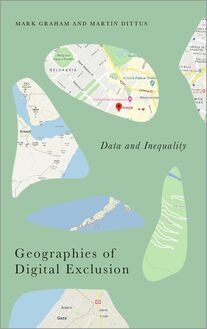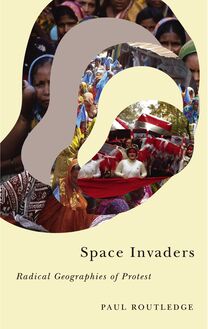-
 Univers
Univers
-
 Ebooks
Ebooks
-
 Livres audio
Livres audio
-
 Presse
Presse
-
 Podcasts
Podcasts
-
 BD
BD
-
 Documents
Documents
-
- Cours
- Révisions
- Ressources pédagogiques
- Sciences de l’éducation
- Manuels scolaires
- Langues
- Travaux de classe
- Annales de BEP
- Etudes supérieures
- Maternelle et primaire
- Fiches de lecture
- Orientation scolaire
- Méthodologie
- Corrigés de devoir
- Annales d’examens et concours
- Annales du bac
- Annales du brevet
- Rapports de stage
La lecture à portée de main
Vous pourrez modifier la taille du texte de cet ouvrage
Découvre YouScribe en t'inscrivant gratuitement
Je m'inscrisDécouvre YouScribe en t'inscrivant gratuitement
Je m'inscrisEn savoir plus
Vous pourrez modifier la taille du texte de cet ouvrage
En savoir plus

Description
Today's urban environments are layered with data and algorithms that fundamentally shape how we perceive and move through space. But are our digitally dense environments continuing to amplify inequalities rather than alleviate them? This book looks at the key contours of information inequality, and who, what and where gets left out.
Platforms like Google Maps and Wikipedia have become important gateways to understanding the world, and yet they are characterised by significant gaps and biases, often driven by processes of exclusion. As a result, their digital augmentations tend to be refractions rather than reflections: they highlight only some facets of the world at the expense of others.
This doesn't mean that more equitable futures aren't possible. By outlining the mechanisms through which our digital and material worlds intersect, the authors conclude with a roadmap for what alternative digital geographies might look like.
List of Figures
Series Preface
Acknowledgements
1. We All Are Digital Geographers
2. When the Map Becomes the Territory
3. Making Digital Geographies
4. A Geography of Digital Geographies
5. Digital Augmentations of the City
6. Who are the Map-Makers?
7. Information Power and Inequality
8. Towards More Just Digital Geographies
Epilogue
Appendix
Reference tables
Data sources
Methodology for Chapter 5
Bibliography
Index
Sujets
Informations
| Publié par | Pluto Press |
| Date de parution | 20 janvier 2022 |
| Nombre de lectures | 0 |
| EAN13 | 9781786807427 |
| Langue | English |
| Poids de l'ouvrage | 1 Mo |
Informations légales : prix de location à la page 0,1348€. Cette information est donnée uniquement à titre indicatif conformément à la législation en vigueur.
Extrait
Geographies of Digital Exclusion
Conceptually rich and well-illustrated, this is a valuable analysis of data power at the global scale.
-Professor Rob Kitchin, Maynooth University
An enlightening and accessible introduction to digital geographies and why they are important to our understanding of digital exclusion.
-Alex Singleton, Professor of Geographic Information Science, University of Liverpool
Demonstrates how so much digital data is sourced from a very limited range of geographical locations and laboured over in various ways, and what difference this makes to the information about places on platforms like OpenStreetMap, Google Maps and Wikipedia.
-Gillian Rose, Professor of Human Geography, School of Geography and the Environment, University of Oxford
Systematic, sobering, yet uplifting, this volume makes the convincing case that digital transformation is not the end of geography, nor is it an equaliser for the diverse cultures and peoples across the globe.
-Jack Linchuan Qiu, Professor at the Department of Communications and New Media, National University of Singapore
An important and insightful book. Graham and Dittus eloquently map, measure and critically interrogate digital geographies in a way that forces us to reckon with their power and politics, the injustices they incur, and how we might imagine alternatives.
-Professor Lina Dencik, Co-Director of the Data Justice Lab, Cardiff University
A must read for those deeply concerned about long hidden people and places who have been marginalised in the politics of place-making, including within digital worlds like Wikipedia and Google.
-Payal Arora, author of The Next Billion Users and Co-Founder of FemLab.Co
Radical Geography
Series Editors:
Danny Dorling, Matthew T. Huber and Jenny Pickerill Former editor: Kate Derickson
Also available:
Disarming Doomsday:
The Human Impact of Nuclear Weapons since Hiroshima
Becky Alexis-Martin
Unlocking Sustainable Cities:
A Manifesto for Real Change
Paul Chatterton
In Their Place:
The Imagined Geographies of Poverty
Stephen Crossley
Making Workers:
Radical Geographies of Education
Katharyne Mitchell
Space Invaders:
Radical Geographies of Protest
Paul Routledge
Data Power:
Radical Geographies of Control and Resistance
Jim E. Thatcher and Craig M. Dalton
New Borders:
Migration, Hotspots and the European Superstate
Antonis Vradis, Evie Papada, Joe Painter and Anna Papoutsi
Geographies of Digital Exclusion
Data and Inequality
Mark Graham and Martin Dittus
First published 2022 by Pluto Press
New Wing, Somerset House, Strand, London WC2R 1LA
www.plutobooks.com
Copyright Mark Graham and Martin Dittus 2022
The right of Mark Graham and Martin Dittus to be identified as the authors of this work has been asserted in accordance with the Copyright, Designs and Patents Act 1988.
British Library Cataloguing in Publication Data
A catalogue record for this book is available from the British Library
ISBN 978 0 7453 4019 7 Hardback
ISBN 978 0 7453 4018 0 Paperback
ISBN 978 1 786807 41 0 PDF
ISBN 978 1 786807 42 7 EPUB
This book is printed on paper suitable for recycling and made from fully managed and sustained forest sources. Logging, pulping and manufacturing processes are expected to conform to the environmental standards of the country of origin.
Typeset by Stanford DTP Services, Northampton, England
Simultaneously printed in the United Kingdom and United States of America
Contents
List of Figures
Series Preface
Acknowledgements
1 We All Are Digital Geographers
The cartographic attributes of the invisible
From cosmographies to digital geographies
Maps are not the territory
2 When the Map Becomes the Territory
Pre-digital geographies of information
Democratising geographies and economies?
3 Making Digital Geographies
The collection of geospatial data
Organising the information
A geospatial platform ecology
Two complementary approaches
4 A Geography of Digital Geographies
How to map digital maps
The world according to Wikipedia
A gallery of digital maps
A global map?
5 Digital Augmentations of the City
How to map Google Maps
The city according to Google
A geolinguistic hegemony?
6 Who are the Map-Makers?
Who contributes to Wikipedia?
Information environments
Participation environments
Limits to the universal platform?
7 Information Power and Inequality
Wikipedia s geolinguistic contours
Information equity and spatial contestation
What are the responsibilities of the map-maker?
8 Towards More Just Digital Geographies
Introduction
Principles for the digital geographies of the future
Building digital geographies of the future?
What comes next?
Epilogue
Appendix
Reference tables
Data sources
Methodology for Chapter 5
Bibliography
Index
Figures
1.1 The Codex Nitriensis
1.2 The Carta Marina
4.1 Geotags in the Wikipedia article for Bhutan
4.2 The global locations of geotagged articles across all of Wikipedia s language editions
4.3 Wikipedia geotags in Southern Europe, the Middle East and North Africa
4.4 Number of Wikipedia articles by country, across all language editions
4.5 Number of Wikipedia articles by surface area, across all language editions
4.6 Number of Wikipedia articles per million people, across all language editions
4.7 Number of Wikipedia articles by global region, compared to population size and surface area
4.8 Wikipedia content over time, by region, across all language editions
4.9 Amounts of Wikipedia content for the ten most widely spoken languages
4.10 Estimated Google Maps coverage, aggregated across the ten most widely spoken languages
4.11 Estimated Google Maps coverage, normalised by population
4.12 Google Maps content volumes for the ten most widely spoken languages
4.13 Estimated Google Maps coverage for four widely spoken languages: Arabic, English, Hindi and Spanish
4.14 Number of nodes in OpenStreetMap per thousand people
4.15 Number of entries in the GeoNames database per million people
4.16 Number of observations in iNaturalist per million people
5.1 Results of an Arabic-language restaurant search in Kafr Qasim, near the West Bank
5.2 Map coverage by location and search language
5.3 Content density in Kolkata for Bengali, Hindi and English
5.4 Aggregated volume of search results by place and language
5.5 Content density in Kolkata for Bengali, English and Hindi
5.6 Majority content languages in Hong Kong
5.7 Estimated Google Maps coverage in four widely spoken languages: Arabic, Portuguese, French and Spanish
5.8 Share of search results by search and result language
6.1 Measures of digital participation by world regions
6.2 Wikipedia pageviews per internet-connected person, across all Wikipedia language versions
6.3 Anonymous Wikipedia edits across all language versions by contributor location, normalised by the number of internet users in each country
6.4 Edits to the Arabic-, English-, Hindi- and Spanish-language editions of Wikipedia
6.5 Wikipedia edits by anonymous editors over time, by editor location, across all Wikipedia language versions
6.6 Wikipedia edits by editor location relative to Europe, across all Wikipedia language versions
6.7 Internet users per country as share of the population
6.8 Cost of broadband relative to average income
7.1 Wikipedia s local content equity
7.2 Contribution outflows on Wikipedia per global region
7.3 Contribution inflows on Wikipedia per global region
7.4 Local content equity on Wikipedia over time
7.5 Share of population literate in the most prevalent local language
7.6 Wikipedia local-language equity
7.7 Wikipedia language prevalence of four major languages
Series Preface
The Radical Geography series consists of accessible books which use geographical perspectives to understand issues of social and political concern. These short books include critiques of existing government policies and alternatives to staid ways of thinking about our societies. They feature stories of radical social and political activism, guides to achieving change, and arguments about why we need to think differently on many contemporary issues if we are to live better together on this planet.
A geographical perspective involves seeing the connections within and between places, as well as considering the role of space and scale to develop a new and better understanding of current problems. Written largely by academic geographers, books in the series deliberately target issues of political, environmental and social concern. The series showcases clear explications of geographical approaches to social problems, and it has a particular interest in action currently being undertaken to achieve positive change that is radical, achievable, real and relevant.
The target audience ranges from undergraduates to experienced scholars, as well as from activists to conventional policy-makers, but these books are also for people interested in the world who do not already have a radical outlook and who want to be engaged and informed by a short, well written and thought-provoking book.
Danny Dorling, Matthew T. Huber and Jenny Pickerill
Series Editors
Acknowledgements
This work in this book is inspired, encouraged and motivated by a few key people and projects. We would like to acknowledge: Matt Zook for his pioneering work in the field of digital geography that provided a foundation for us to pursue our own work in this area; the rest of the Floating Sheep Collective (Taylor Shelton, Monica Stephens, Ate Poorthuis) for making internet geography both critical and fun; Bernie Hogan, Ilhem Allagui, Ralph Straumann, Ahmed Medhat, Sanna Ojanper , Ali Frihida, Claudio Calvino, Stefano De Sabbata, Richard Farmbrough, Heather Ford, Frederike Kaltheuner, David Palfrey, Gavin Bailey, Kalina Bontcheva, Taha Yasseri and Clarence Singleton for being star collaborat
-
 Univers
Univers
-
 Ebooks
Ebooks
-
 Livres audio
Livres audio
-
 Presse
Presse
-
 Podcasts
Podcasts
-
 BD
BD
-
 Documents
Documents
-
Jeunesse
-
Littérature
-
Ressources professionnelles
-
Santé et bien-être
-
Savoirs
-
Education
-
Loisirs et hobbies
-
Art, musique et cinéma
-
Actualité et débat de société
-
Jeunesse
-
Littérature
-
Ressources professionnelles
-
Santé et bien-être
-
Savoirs
-
Education
-
Loisirs et hobbies
-
Art, musique et cinéma
-
Actualité et débat de société
-
Actualités
-
Lifestyle
-
Presse jeunesse
-
Presse professionnelle
-
Pratique
-
Presse sportive
-
Presse internationale
-
Culture & Médias
-
Action et Aventures
-
Science-fiction et Fantasy
-
Société
-
Jeunesse
-
Littérature
-
Ressources professionnelles
-
Santé et bien-être
-
Savoirs
-
Education
-
Loisirs et hobbies
-
Art, musique et cinéma
-
Actualité et débat de société
- Cours
- Révisions
- Ressources pédagogiques
- Sciences de l’éducation
- Manuels scolaires
- Langues
- Travaux de classe
- Annales de BEP
- Etudes supérieures
- Maternelle et primaire
- Fiches de lecture
- Orientation scolaire
- Méthodologie
- Corrigés de devoir
- Annales d’examens et concours
- Annales du bac
- Annales du brevet
- Rapports de stage












